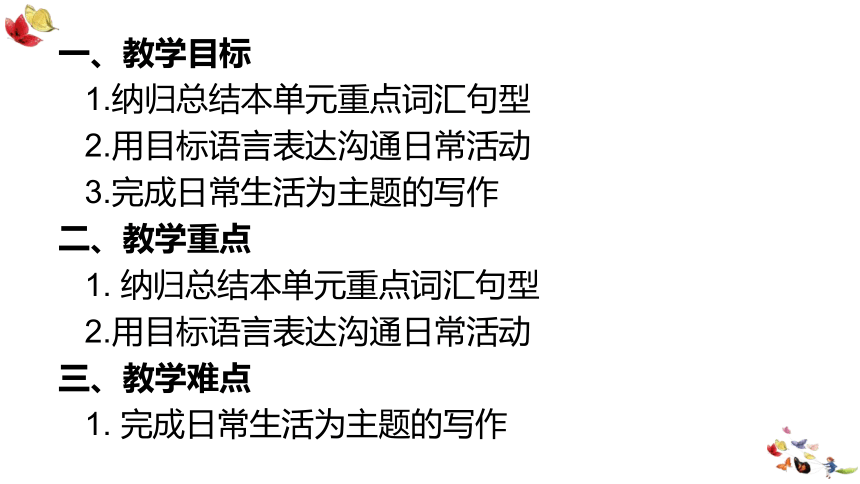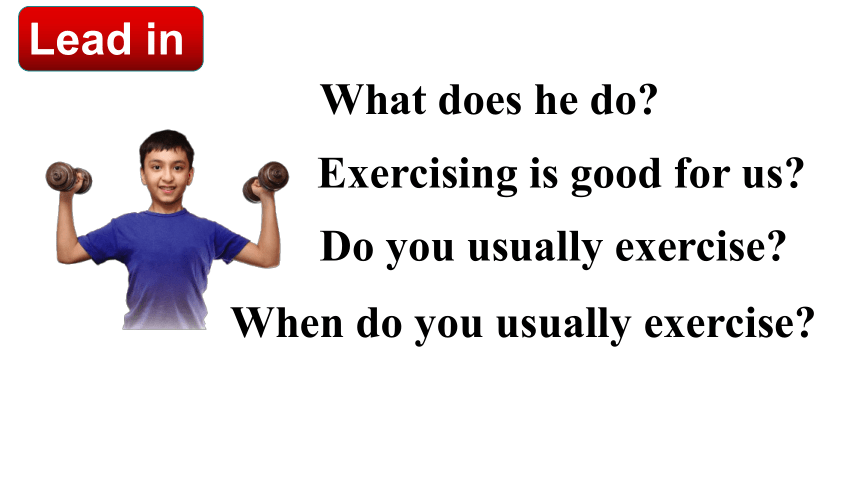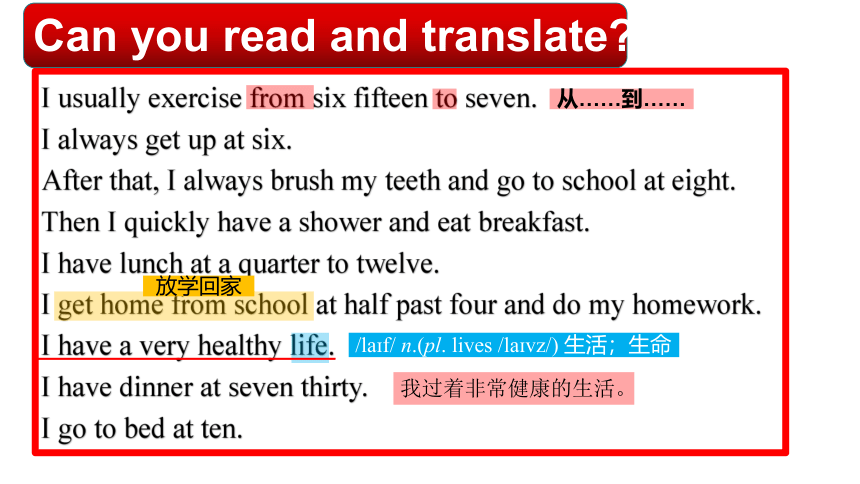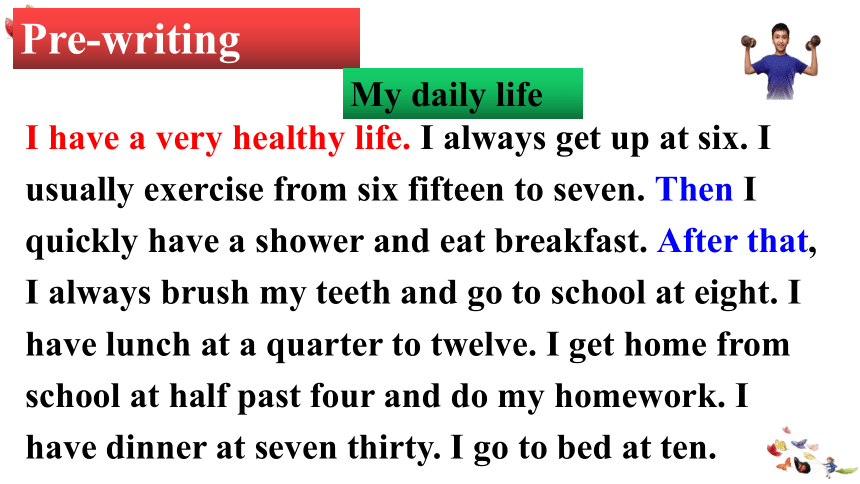Unit2 What time do you go to school.SectionB 3a-self check 课件(共18张PPT)
文档属性
| 名称 | Unit2 What time do you go to school.SectionB 3a-self check 课件(共18张PPT) |  | |
| 格式 | pptx | ||
| 文件大小 | 1.2MB | ||
| 资源类型 | 试卷 | ||
| 版本资源 | 人教新目标(Go for it)版 | ||
| 科目 | 英语 | ||
| 更新时间 | 2023-02-04 08:00:06 | ||
图片预览







文档简介
(共18张PPT)
Unit 2 What time do you go to school
Section B (3a-Self Check)
一、教学目标
1.纳归总结本单元重点词汇句型
2.用目标语言表达沟通日常活动
3.完成日常生活为主题的写作
二、教学重点
1. 纳归总结本单元重点词汇句型
2.用目标语言表达沟通日常活动
三、教学难点
1. 完成日常生活为主题的写作
I either watch TV or
play computer games.
It’s not good for her.
But it tastes good.
When does
he exercise
他有一份有趣的工作。
我从不这么早起床。
I usually eat breakfast
at 7:15.
What time do
you get up
Fast reaction
英汉互译,遇到炸弹,大声说“bomb”
Review: Fast answer
Do you usually exercise
When do you usually exercise
Exercising is good for us
Lead in
What does he do
I usually exercise from six fifteen to seven.
I always get up at six.
After that, I always brush my teeth and go to school at eight.
Then I quickly have a shower and eat breakfast.
I have lunch at a quarter to twelve.
I get home from school at half past four and do my homework.
I have a very healthy life.
I have dinner at seven thirty.
I go to bed at ten.
从……到……
/la f/ n.(pl. lives /la vz/) 生活;生命
我过着非常健康的生活。
放学回家
Can you read and translate
___ I usually exercise from six fifteen to seven.
___ I always get up early at six.
___ After that, I always brush my teeth and go to school at eight.
___Then I quickly have a shower and eatbreakfast.
___ I have lunch at a quarter to twelve.
___ I get home from school at half past four and do my homework.
___ I have a very healthy life.
___ I have dinner at seven thirty.
___ I go to bed at ten.
Number these sentences in order to
make a story about a daily routine.
1
2
4
5
6
7
3
8
9
3a
I have a very healthy life. I always get up at six. I usually exercise from six fifteen to seven. Then I quickly have a shower and eat breakfast. After that, I always brush my teeth and go to school at eight. I have lunch at a quarter to twelve. I get home from school at half past four and do my homework. I have dinner at seven thirty. I go to bed at ten.
Pre-writing
My daily life
My daily life
I am busy every day. Every morning, I get up at 6:30. At 6:50, I eat breakfast . I have to go to school at ten past seven. I often have lunch at twelve o’clock. From 1pm to 2pm, I take a break. Later, have my class. Sometimes, I play sports for one hour after 17:10. Then I go home. After eating dinner, I do my homework at 19:30. I go to bed at 22:00.
Time and tide wait for no man. Although my life is busy, I have to study hard and enjoy it .
全文使用“after, after doing, later, then ”等连词使行文连贯,更有层次感。
引用了Extensive languages中的名言“Time and tide wait for no man.”,语句活泼流利,用词精当,道出珍惜时间、努力学习的态度和决心。
Show time
本文脉络清晰,整篇文章非常有条理性。
以时间为线索展开描述,随着时间的迁移,写出了作者一天忙碌的生活,时间的表达使用恰当,句子安排合理。
第一句话直入主题,给整篇文章定下了忙碌的基调。
My daily life
During weekdays, my daily life is as busy as most of students in China. In the morning, I have to get up at 6:30. Twenty minutes later, I eat breakfast. At 7:10, I go to school. There are 5 classes in the morning. I often have lunch at twelve o’clock. At 1pm, I begin to take a break. It often lasts for one hour. Half an hour Later, I have my another three classes. After class, I play sports for one hour. It’s good for my health. I have much homework to do. I begin to do it at 19:30. I don’t go to bed until ten every evening.
What a busy life it is ! But I think it is meaningful because I can learn a lot and enjoy it every day .
通过使用“in the morning, at twelve, every evening”等时间的表达,使文章衔接连贯自然,同时又使用“There are…, I begin to … It lasts… I have another… ”等句式使文章语言丰富流畅,亮点突出,字里行间都体现出了忙碌的一天。
结尾处表明作者的观点,要珍惜时间,努力学习,享受生活,引起读者共鸣。
本文思路清晰,结构完整,全部涵盖了图表内容。
第一句话以学生的角度现身说法,通过短语 “as …as”的运用, 巧妙地以点带面,表明了学生的日常生活是忙碌的。
Can you write
3b
____________________________________________________________________________________________________________________________________________________________________________________________________________________________________________________________________________
How to write
小组讨论,文中在介绍Tony ’day, Mary ’day时
按什么顺序写的?分别都用到了哪几类词汇?
日常活动
时间短语
频率副词
关联词
介绍某人的
一天
以时间为顺序
以第三人称叙事时,注意
动词的人称和数的变化。
usually
never
sometimes
…
after that ,
then
so
after dinner
….
get up
eat breakfast
go to bed
…..
Writing guidance
审题 体裁 话题
时态 人称
段落 布局
开篇点题
描述一天的活动
上午: get up; eat breakfast; brush teeth
go to school; have classes
中午: eat lunch…
下午: play basketball; go home
晚上: eat dinner,do homework; go to bed
句与句之间适当采用连接词
This is a(an).... day.
记叙文
介绍日常活动
一般现在时
第一人称
then; after that, and, but,...
Writing
Let’s try to write
Writing
Sharing time
1. Match the verbs in column A with the words in column B. Then use the phrases to complete the sentences.
taste
clean
have
get
take
brush
your teeth
my room
a walk
good
dressed
a good job
Self Check
1. Ice-cream usually ___________ so students like to eat it after school.
2. My grandparents are very healthy. They always ___________ after dinner.
3.You need to ______________ after eating to have good teeth.
4. He ______________. He works at a radio station.
5. Here are your clothes. Go and __________ quickly!
6. I don’t have time to _____________ from Monday to Friday. So I clean it on weekends.
tastes good
take a walk
brush your teeth
has a good job
get dressed
clean my room
2. Complete the conversations with questions and answers.
Use the words in brackets to help you.
1. A: ___________________________________________
(your mother/usually/get up)
B: ___________________________________________.
(5:45)
A: ___________________________________________
(why/get up/so early)
B: ____________________________________________.
(always/make breakfast for me)
What time does your mother usually get up
She usually gets up at 5:45 in the morning
Why does she get up so early
Because she always makes breakfast for me
Thank you for listening!
Unit 2 What time do you go to school
Section B (3a-Self Check)
一、教学目标
1.纳归总结本单元重点词汇句型
2.用目标语言表达沟通日常活动
3.完成日常生活为主题的写作
二、教学重点
1. 纳归总结本单元重点词汇句型
2.用目标语言表达沟通日常活动
三、教学难点
1. 完成日常生活为主题的写作
I either watch TV or
play computer games.
It’s not good for her.
But it tastes good.
When does
he exercise
他有一份有趣的工作。
我从不这么早起床。
I usually eat breakfast
at 7:15.
What time do
you get up
Fast reaction
英汉互译,遇到炸弹,大声说“bomb”
Review: Fast answer
Do you usually exercise
When do you usually exercise
Exercising is good for us
Lead in
What does he do
I usually exercise from six fifteen to seven.
I always get up at six.
After that, I always brush my teeth and go to school at eight.
Then I quickly have a shower and eat breakfast.
I have lunch at a quarter to twelve.
I get home from school at half past four and do my homework.
I have a very healthy life.
I have dinner at seven thirty.
I go to bed at ten.
从……到……
/la f/ n.(pl. lives /la vz/) 生活;生命
我过着非常健康的生活。
放学回家
Can you read and translate
___ I usually exercise from six fifteen to seven.
___ I always get up early at six.
___ After that, I always brush my teeth and go to school at eight.
___Then I quickly have a shower and eatbreakfast.
___ I have lunch at a quarter to twelve.
___ I get home from school at half past four and do my homework.
___ I have a very healthy life.
___ I have dinner at seven thirty.
___ I go to bed at ten.
Number these sentences in order to
make a story about a daily routine.
1
2
4
5
6
7
3
8
9
3a
I have a very healthy life. I always get up at six. I usually exercise from six fifteen to seven. Then I quickly have a shower and eat breakfast. After that, I always brush my teeth and go to school at eight. I have lunch at a quarter to twelve. I get home from school at half past four and do my homework. I have dinner at seven thirty. I go to bed at ten.
Pre-writing
My daily life
My daily life
I am busy every day. Every morning, I get up at 6:30. At 6:50, I eat breakfast . I have to go to school at ten past seven. I often have lunch at twelve o’clock. From 1pm to 2pm, I take a break. Later, have my class. Sometimes, I play sports for one hour after 17:10. Then I go home. After eating dinner, I do my homework at 19:30. I go to bed at 22:00.
Time and tide wait for no man. Although my life is busy, I have to study hard and enjoy it .
全文使用“after, after doing, later, then ”等连词使行文连贯,更有层次感。
引用了Extensive languages中的名言“Time and tide wait for no man.”,语句活泼流利,用词精当,道出珍惜时间、努力学习的态度和决心。
Show time
本文脉络清晰,整篇文章非常有条理性。
以时间为线索展开描述,随着时间的迁移,写出了作者一天忙碌的生活,时间的表达使用恰当,句子安排合理。
第一句话直入主题,给整篇文章定下了忙碌的基调。
My daily life
During weekdays, my daily life is as busy as most of students in China. In the morning, I have to get up at 6:30. Twenty minutes later, I eat breakfast. At 7:10, I go to school. There are 5 classes in the morning. I often have lunch at twelve o’clock. At 1pm, I begin to take a break. It often lasts for one hour. Half an hour Later, I have my another three classes. After class, I play sports for one hour. It’s good for my health. I have much homework to do. I begin to do it at 19:30. I don’t go to bed until ten every evening.
What a busy life it is ! But I think it is meaningful because I can learn a lot and enjoy it every day .
通过使用“in the morning, at twelve, every evening”等时间的表达,使文章衔接连贯自然,同时又使用“There are…, I begin to … It lasts… I have another… ”等句式使文章语言丰富流畅,亮点突出,字里行间都体现出了忙碌的一天。
结尾处表明作者的观点,要珍惜时间,努力学习,享受生活,引起读者共鸣。
本文思路清晰,结构完整,全部涵盖了图表内容。
第一句话以学生的角度现身说法,通过短语 “as …as”的运用, 巧妙地以点带面,表明了学生的日常生活是忙碌的。
Can you write
3b
____________________________________________________________________________________________________________________________________________________________________________________________________________________________________________________________________________
How to write
小组讨论,文中在介绍Tony ’day, Mary ’day时
按什么顺序写的?分别都用到了哪几类词汇?
日常活动
时间短语
频率副词
关联词
介绍某人的
一天
以时间为顺序
以第三人称叙事时,注意
动词的人称和数的变化。
usually
never
sometimes
…
after that ,
then
so
after dinner
….
get up
eat breakfast
go to bed
…..
Writing guidance
审题 体裁 话题
时态 人称
段落 布局
开篇点题
描述一天的活动
上午: get up; eat breakfast; brush teeth
go to school; have classes
中午: eat lunch…
下午: play basketball; go home
晚上: eat dinner,do homework; go to bed
句与句之间适当采用连接词
This is a(an).... day.
记叙文
介绍日常活动
一般现在时
第一人称
then; after that, and, but,...
Writing
Let’s try to write
Writing
Sharing time
1. Match the verbs in column A with the words in column B. Then use the phrases to complete the sentences.
taste
clean
have
get
take
brush
your teeth
my room
a walk
good
dressed
a good job
Self Check
1. Ice-cream usually ___________ so students like to eat it after school.
2. My grandparents are very healthy. They always ___________ after dinner.
3.You need to ______________ after eating to have good teeth.
4. He ______________. He works at a radio station.
5. Here are your clothes. Go and __________ quickly!
6. I don’t have time to _____________ from Monday to Friday. So I clean it on weekends.
tastes good
take a walk
brush your teeth
has a good job
get dressed
clean my room
2. Complete the conversations with questions and answers.
Use the words in brackets to help you.
1. A: ___________________________________________
(your mother/usually/get up)
B: ___________________________________________.
(5:45)
A: ___________________________________________
(why/get up/so early)
B: ____________________________________________.
(always/make breakfast for me)
What time does your mother usually get up
She usually gets up at 5:45 in the morning
Why does she get up so early
Because she always makes breakfast for me
Thank you for listening!
同课章节目录
- Unit 1 Can you play the guitar?
- Section A
- Section B
- Unit 2 What time do you go to school?
- Section A
- Section B
- Unit 3 How do you get to school?
- Section A
- Section B
- Unit 4 Don't eat in class.
- Section A
- Section B
- Unit 5 Why do you like pandas?
- Section A
- Section B
- Unit 6 I'm watching TV.
- Section A
- Section B
- Review of Units 1-6
- Unit 7 It's raining!
- Section A
- Section B
- Unit 8 Is there a post office near here?
- Section A
- Section B
- Unit 9 What does he look like?
- Section A
- Section B
- Unit 10 I'd like some noodles.
- Section A
- Section B
- Unit 11 How was your school trip?
- Section A
- Section B
- Unit 12 What did you do last weekend?
- Section A
- Section B
